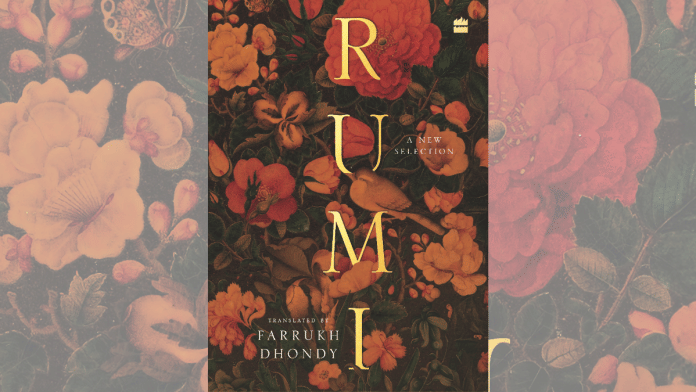Celebrated author, playwright, and screenwriter Farrukh Dhondy’s latest book, Rumi, takes an insightful look into the life and works of Jalal-al-Din Rumi, one of the most widely read poets in the world today. The book explores Rumi’s poetry, its intrinsic connection to Sufi Islamic thought, and the way it has been reshaped for a contemporary Western audience.
Rumi, born in 1207 in the Persian Empire, wrote primarily in Persian with elements of Arabic and Turkish. His magnum opus, the Masnavi, often called the “Quran in verse,” is a spiritual guide that delves into Islamic mysticism. However, as Dhondy highlights, Rumi’s poetry has been reinterpreted in the West, with much of its original religious context removed. Today, his verses are often seen as universal meditations on love and self-discovery, rather than expressions of devotion to the divine.
Published by HarperCollins India, ‘Rumi: A New Selection’ by Farrukh Dhondy will be released on 2 April on SoftCover, ThePrint’s online platform for launching non-fiction books.
Dhondy’s Rumi examines this transformation and asks whether modern readers truly understand the poet’s intent. He explores Rumi’s deep spiritual relationship with Shams Tabriz, the central role of love as a metaphor for divine connection, and the significance of the poet’s teachings within Sufism. The book also critiques how English-language translations, particularly by bestselling interpreters like Coleman Barks, have altered Rumi’s words to appeal to a secular audience unfamiliar with Islamic mysticism.
Dhondy is an acclaimed writer known for his works across fiction, non-fiction, television, and film. Born in India and educated at Cambridge, he was a key figure in Britain’s Black Panther movement and has written extensively on race, culture, and politics. His notable books include Poona Company, Prophet of Love, and Hawk and Hyena.
Speaking about the book the author says, “Translations proverbially suffer ‘loss’ —of cultural context, impact, form—but one hopes not of meaning. As a translating versifier one tries to minimise the loss and stay as faithful as possible to Sufi ‘theology’ and to convey a close English equivalent of the poet’s rhyme and rhythm. One bewildering difficulty for any Rumi translator is which drops to choose from his vast oceans of verse.”
With Rumi, Dhondy offers a thought-provoking analysis that challenges readers to reconsider the poet’s work beyond its popularized versions. The book is essential reading for poetry lovers, scholars of Sufism, and those interested in cultural translation and literary adaptation.
Prerna Gill, commissioning editor, HarperCollins India says, “Rumi’s poetry has always been fragrant in its pining for oneness with something far greater than the personal. With a translation so tender yet sure, that perfume lingers. This is a book that already belongs to everyone—it’s simply waiting to be reunited with all its readers.”
Also read: New book delves into the history and journey of iconic Indian newspaper






